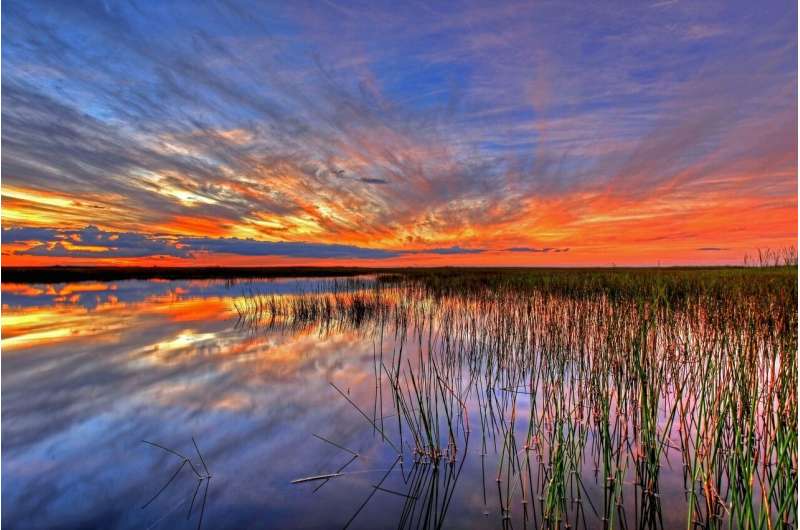Finally reclaiming the Florida Everglades is within reach

A historic moment has arrived for the Everglades.
If we only recognize it and seize it.
Last month, every single Florida member of the U.S. House of Representatives, Republican and Democrat, wrote to President Joseph R. Biden urging him to seek "robust funding" for the sporadically stalled environmental repair project that aims to redirect the flow of water south, as the Everglades used to do naturally.
That's right. Democrats like Ted Deutch and Lois Frankel joined with Republicans Brian Mast and the embattled Matt Gaetz to sign the same letter. Sen. Marco Rubio signed it, too, the first name on the list. And Sen. Rick Scott wrote his own letter asking Biden for "full and robust" Everglades funding.
A smaller bipartisan group of Florida representatives followed up last week with a letter imploring a key House committee, Transportation and Infrastructure, to amply fund Everglades restoration as it begins considering legislation for Biden's proposed infrastructure package.
In other words, even politicians who normally recoil at large, activist government projects are enthusiasts for correcting the 20th-century canal-building and swamp-draining that, while opening South Florida to agriculture, houses, malls and golf courses, have meant ecological disaster for the once-healthy "River of Grass."
And Biden should be an easy sell. He has already named Everglades restoration as one of the many public works projects he wants to underwrite with his sweeping $2.25 trillion infrastructure bill.
This is the best news for the Everglades in a very long time.
Which means, it's good news for everyone who lives in South Florida.
If the Everglades returns to its natural flow, or something like it, we'll endure far fewer Lake Okeechobee discharges of polluted water that fuel toxic blue-green algae and exacerbate red tide. We'll do much to protect our water supply and shore up our aging flood protection infrastructure. We'll probably see the return of wading birds and other species in a healthier Everglades ecosystem.
Not the least, a stronger southerly flow of fresh water will help stave off the growing threat of salt-water intrusion from rising sea levels. "This is the fastest way for us to make the best progress on climate," Eric Eikenberg, CEO of the Everglades Foundation, told The Palm Beach Post Editorial Board.
Whether or not that's strictly true, there's no doubt that a thriving Everglades would be a wondrous thing for this state. And that dramatic progress for the ecosystem's restoration is long overdue.
When the legislation was signed during the last days of the Clinton administration, the billions of dollars for this massive endeavor were supposed to be equally borne by the state and the federal government. But Florida's contributions sagged considerably after the 2009 recession. And Washington has turned out to be an unreliable partner.
So far, Florida has spent about $5 billion on a chunk of the 68 public-works projects on U.S. Army Corps of Engineers' construction list. But the feds have ponied up just $2 billion. The split is a vastly unequal 72%-28%.
Biden's ambitious infrastructure bill is the best hope in ages to get close to a 50-50 state and federal split and to finish by 2030 all the remaining aspects of the comprehensive plan that Congress has already approved.
The estimated cost of those approved projects, plus a newer one on the list for the Loxahatchee Watershed, is $7 billion. If the feds spend $5 billion and the state spends $2 billion in this decade (reversing the split of the last 20 years), we'll hit the number.
The economic impact for this region could be profound. Economic studies have shown that every $1 invested in the Everglades will bring back $4 in economic benefits once the ecosystem is thriving and open to fishing, lodging, tourism and the like.
"This is a historic opportunity," Eikenberg said, "to make a great leap forward for the Everglades."
Or, as Steve Davis, a senior wetlands ecologist with the Everglades Foundation, said: "This is our shot to get Everglades restoration across the finish line."
Or, as Jeb Bush, Florida's governor when the restoration project started, wrote in a recent op-ed: "The coming infrastructure bill is a once-in-a-lifetime opportunity for the federal government to balance the ledger and make up for lost time."
On the whole planet, there is only one Everglades. Now stands the chance to finally repair the ecological errors of earlier generations.
We urge every Floridian in Congress—whatever other differences they may hold over the infrastructure bill, or over anything else—to do all they can to see that the Army Corps gets the money it needs to finish the projects on its schedule, and make the River of Grass vital again.
©2021 The Palm Beach Post (West Palm Beach, Fla.)
Distributed by Tribune Content Agency, LLC.
















